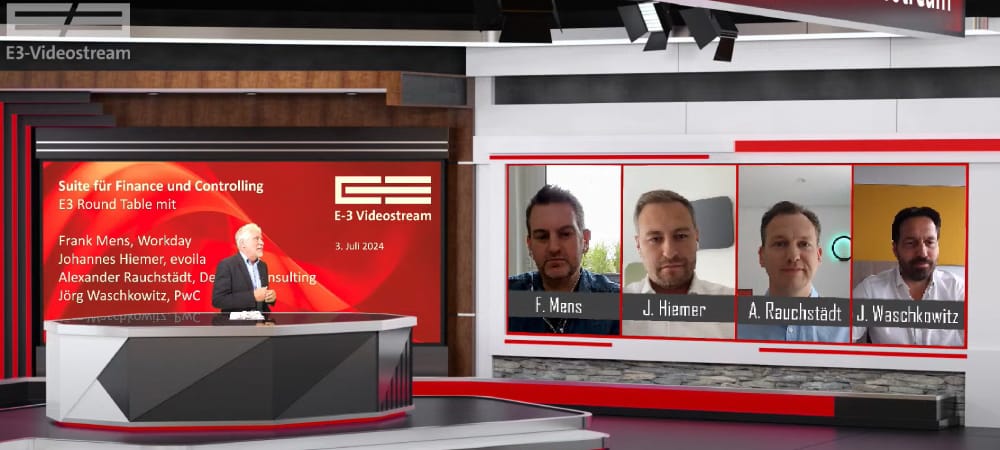![[shutterstock: 376197256, Andrey_Popov]](https://e3mag.com/wp-content/uploads/2013/09/shutterstock_376197256.jpg)

The SAP announced at the end of July this year that Jim Hagemann Snabe as Co-CEO resign with effect from May 2014 and thus Bill McDermott will take over the sole management of the company.
Following his resignation, Snabe intends to SAP–Supervisory Board can be selected. This is significant insofar as the SAP For the first time in its history, the CEO or coCEO with European roots.
In the press and analyst briefing on the change in management SAP the growing US orientation in the SAP-Board of Management and made it clear that SAP is a global company whose management bodies are not dominated by specific regions.
In this context SAP points out that currently 46 percent of the SAP-workforce in EMEA, followed by America with 30 percent and the Asia-Pacific region with 24 percent - a distribution that a USCEO will balance things out a little.
It also has SAP with San Francisco and Walldorf two company headquarters for some time now. Bill McDermott answered the questions as to whether he would spend more time in Walldorf and also learn German.
In this context, it is interesting to note that Jim Hagemann Snabe speaks fluent German, but comes from Denmark and has his office in Copenhagen, from where he often travels to Walldorf travels.
Ultimately, this shift of power to the US is just another step, albeit a profound one, in SAP's evolution towards becoming a truly global company that deploys highly skilled people - whether in development or on the board - in the countries in which they are based.
More than ten years ago, the then CTO Shai Agassi with the support of SAPco-founder and Chairman of the Supervisory Board Hasso Plattner an important technology center in Silicon Valley, at the time a major step away from the focus on Germany as a development location.
Developed today SAP in a total of 14 labs in twelve countries. The solution for small companies, such as SAP Business One, will be implemented in China and originally comes from Israel.
The only thing that is really new this time is that such a shift is taking place on the Management Board. However, it should also be noted that the change from a coCEO to a sole CEO already existed before, when Hasso Plattner in the Supervisory Board moved up and Henning Kagermann the sole leadership of the SAP taken over.
Also Léo pharmacist was briefly co-CEObefore he was given sole responsibility.
However, it is likely that SAP's European employees, who after all make up the largest proportion within the three regions, feel underrepresented on the Executive Board, particularly given that Werner Brandta long-standing member of the Board of Directors, will also be leaving the Board next year.
Hasso Plattner pointed out that, with Luka Mucic, a German Werner Brandt will follow.
Nevertheless, we believe that the German and European employees need security in the sense that they will continue to play a key role in the company's strategy in the future, especially in view of SAP's outstanding market position and reputation in Europe.
Effects for customers
According to the IDC European Software Tracker SAP 20 percent share of the enterprise applications market in Western Europe in 2012, 13.5 percentage points ahead of the next largest competitor - truly a strong position in Europe and especially in Germanyalso in relation to the global competition in this market segment.
With this market position behind it, future growth should come from new areas (for example business analytics, mobility, cloud and Databases).
With the exception of the business analytics market, in which SAP is the market leader in Western Europe with a share of 19.9 percent and is 5.5 percentage points behind the number two, the market position of the Walldorf less strongly in the new markets.
Nevertheless, even in these segments, the size of the SAP-customer base and the company's own influence on the market should not be underestimated.
The public perception of the roles of the two co-CEOs was always clear: while Snabe was seen as the software man, Snabe was the software man. Bill McDermott the salesman.
Snabe's resignation leaves a vacuum in the area of product strategy and management. We assume that the rising star at SAP in the research and development area Vishal Sikka, from SAP celebrated several times as "the best innovator in the industry" in the aforementioned analyst call, will fill this vacuum.
He is largely responsible for the recent success of SAP's new Hana platform. When it comes to maintaining SAP's leading position in products, technologies and engineering, McDermott can be expected to continue as the sole CEO will be counting on Sikka.
Nevertheless, Snabe has a high level of credibility, especially with European customers, when he talks about SAP's technology plans. He can be sure of the appreciation of important European board members. At the same time, he has been in regular contact with political heavyweights about the use of IT to increase the competitiveness of European companies with the aim of creating new jobs.
He has frequently spoken at seminars and conferences on research and innovation and the digital agenda for Europe to move the EU forward in this context. All of this has enhanced SAP's reputation as a globally recognized technology leader from Europe and Best Practice for European innovation.
Summary
According to IDC, the performance of the SAP In the past quarters, this was due to a combination of different situations in the regions, which in turn depended heavily on the prevailing economic climate and the effectiveness of the local sales teams.
The strong growth in the Americas region, for example, was remarkable in the past quarter. Just as cross-industry applications are an oxymoron in themselves, as almost all solutions have different characteristics in different industries, applications do not appear to be region-neutral either.
SAP is confronted with local competitors in every region (such as Ufida in China, Oracle in the USA or IFS in Europe) and must convince buyers that it understands the specific needs in the individual regions and designs both applications and implementation aids accordingly.
Similarly, SAP's European customers, partners and employees hope that the company will maintain its strength, presence and influence in the region despite the management change at the top, both for its own benefit and for the benefit of its customers and the innovation region of Europe.
At the same time SAP increasingly develop as a global company that can play to its strengths in all regions and utilize local talent accordingly. This has long been the case for the development department and will also apply to the Management Board from May next year.
Phil Carter is Associate Vice President European Software Research at IDC, a provider of market information and consulting services in the field of information technology.
Henry Morris is a senior Vice President at IDC and globally responsible for software and IT services research as well as for the IDC Sales and Marketing Advisory Groups.




